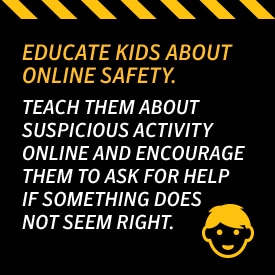10 Internet safety rules to help keep your family safe online
Children today can access more information than any generation before. Because of the Internet they now have a wealth of information that can enrich their lives in new and wondrous ways. But the...

Today’s children are able to access more information than any generation before. Thanks to the Internet we all now have a wealth of information that can enrich our lives in new and wondrous ways. Yet, the Internet also has the potential to harm us and the people we love. Too often we read about another company falling victim to a cyber attack, or a friend’s email or social network account being hacked. These dangers are real.

A security suite that helps protect your devices.
Free security software just doesn’t have the resources to keep up with new threats as they emerge. That’s why you need a multi-layered defense to security. Meet Norton Security Premium — protection for up to 10 of your devices.
Despite the many real reasons to protect your kids and your data from cyber thieves, you shouldn’t shy away from the advantages the Internet offers your family. The bad guys may be smart, but you can be smarter.
Here are 10 options for protecting your family’s devices so they can go online without worry.
- Realize cybersecurity is a moving target.
Cybercriminals are constantly coming up with new threats, so you need to be conscientious about downloading the latest security updates and patches and watching the news for any breaking threats.
- Get wise to phishing.
You may be sophisticated enough to know not to click on a URL that’s supposedly from your bank or a friend, but does everyone in your household? Tell your kids about phishing and warn them not to click on URLs from an email or social network message. Get a security program that recognizes and blocks dodgy URLs.
- Watch out for scams.
There are other ways to trick you into entering information. Even some so-called legitimate businesses can trick you into signing up for recurring annual payments and the like. Watch your credit card statements closely.
- Use a password management system.
Passwords are the primary defense against hackers for most people and it’s no secret that it’s often a flimsy one. Bolster your defense with a password management program. Best of all, this way you only need to remember one password.
- Keep social networks secure.
There’s a good chance that at least one person in your house is on a social network. Unfortunately, social networks have become a draw for cybercriminals. Keep a close eye on your friends’ social network accounts. If someone messages you who hasn’t done so in a while, then be suspicious. Your friend’s account may have been hacked.
- Identify the threat in your household.
Your home Wi-Fi network is another entry point for hackers. Make sure you have a hard-to-crack password and consider security software that identifies “intruders” on the network. Also stress the importance of avoiding public Wi-Fi networks to your kids.
- Educate kids about online safety.
When it comes to cybersecurity, kids are often the weakest link. Get security software that keeps kids from clicking on the wrong links and visiting the wrong sites. Teach kids about suspicious activity online and encourage them to ask for help if something seems suspicious.
- Don’t forget mobile devices.
Your phone and tablet need as much security protection as your PC. Make sure you’ve got a full security solution that covers your mobile devices as well. Put a passcode on your tablets and phones, too.
- Use a credit card.
Credit cards are insured, so use that rather than your debit card.
- When in doubt, call support.
The best security software programs offer 24x7 support. If you ever have any suspicions you’ve been hacked, call for help. Norton Security can help you buy peace of mind without sacrificing your family’s ability to learn and stay connected. It’s your single solution that protects up to five of your devices, whether it’s your desktop, mobile or tablet. And it’s incredibly intelligent — actively providing protection at all times, detecting online threats before they hit, so, when the new school year comes, your family will be ready explore new discoveries.

Editorial note: Our articles provide educational information for you. Our offerings may not cover or protect against every type of crime, fraud, or threat we write about. Our goal is to increase awareness about Cyber Safety. Please review complete Terms during enrollment or setup. Remember that no one can prevent all identity theft or cybercrime, and that LifeLock does not monitor all transactions at all businesses. The Norton and LifeLock brands are part of Gen Digital Inc.





Want more?
Follow us for all the latest news, tips and updates.